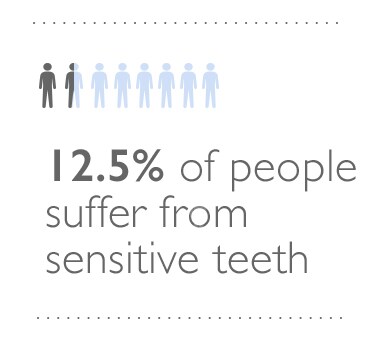Get to know about
your sensitive teeth
your sensitive teeth

What are sensitive teeth?
Ever had the shivers while eating ice cream? You could have sensitive teeth. It means that the enamel on the tooth has thinned, exposing the nerve beneath. Dentin hypersensitivity – to give it its proper name – affects one in eight adults.
Signs you could have sensitive teeth
The number one sign that you have sensitive teeth is that eating certain food and drink can be uncomfortable. People with sensitive teeth often find it painful to eat ice cream and other cold foods, as well as hot drinks like tea and coffee, and sometimes sweet or acidic food too. You may also find it uncomfortable to brush or floss.


What causes sensitive teeth?
The outer layer of enamel on the tooth can be worn down by a number of things. These include: brushing too hard, gum disease, excessive plaque, tooth grinding, tooth-whitening toothpaste, acidic mouthwash and even bad fillings. Identifying which one is causing your teeth to be sensitive is the first step in treating the problem.

How can you treath sensitive teeth?
The good news? Sensitive teeth are treatable. If you’re brushing too hard, try switching to a Philips Sonicare electric toothbrush. If you have gum problems or excessive plaque, brush your teeth and gums more thoroughly. It’s also wise to switch to neutral mouthwash and toothpaste, and sleep with a gum shield if you grind your teeth. Always consult your dentist about any changes to your oral hygiene regime.
-
Sonic electric toothbrush
HX6211/04




